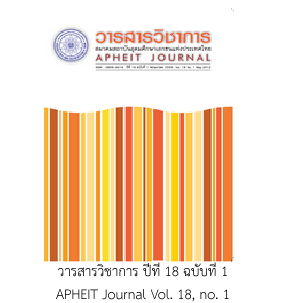Using Scripted and Non Scripted Role Plays to Improve English Speaking Performance of Hotel Engineering Staff
Main Article Content
Abstract
The purpose of this study was to investigate the impact of using scripted and non-scripted role-play activities on EFL learners’ speaking performance. The participants in the study were twelve engineering staff members of a hotel in Phuket. They were divided into two groups. Both groups attended 15 lessons of the English for Hotel Engineering Staff course. The lessons were given twice a week; each lesson lasted two hours. At the end of the lesson, staff members in one group were asked to pair up and perform scripted role-play activities whereas those in the other group performed non-scripted ones in a separate room. An actual interaction with a native speaker of English was used as the pre-test and post-test to assess the participants’ oral English performance at the beginning and at the end of the study. The results of the study show that the twelve participants’ overall post-test scores were significantly higher than their pre-test scores at the level of 0.01, indicating that both scripted and non-scripted role-play activities helped the participants to improve their English speaking performance. However, non-scripted role-plays contributed to the improvement of the participants’ discrete oral performance to a more significant degree than scripted ones. The t-test results reveal that the six participants assigned to practice non-scripted role-plays showed significant speaking improvements especially in terms of accent and comprehension at the level of 0.01. Their post-test scores on vocabulary and fluency were also significantly higher than the pre-test scores at the level of 0.01. The other six participants, who were assigned to perform scripted role-plays, showed significant improvement at the level of 0.01only in terms of vocabulary. The study suggests that non-scripted role-play activities better contribute to the holistic improvement in oral English performance of the Thai EFL learners than scripted ones. Further studies are recommended to investigate the outcome of using the two types of role-play with different groups of learners, particularly those with higher levels of proficiency, and to find ways to make the most of each type of role-play in improving different aspects of the learners’ speaking performance.
Article Details
Issue
Section
Research Article

